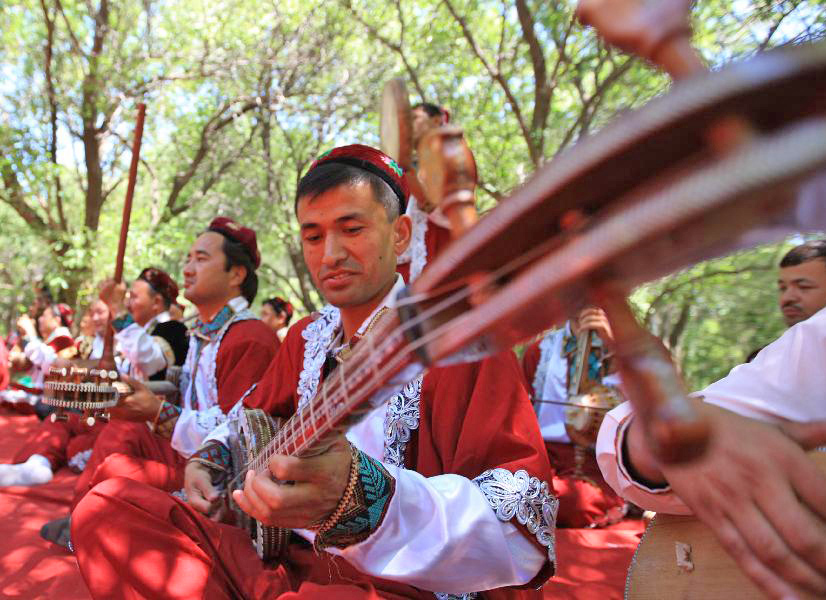Database to preserve ethnic oral traditions

The Xinjiang Uyghur Muqam is the general term for Muqam practices, including songs, dances and folk and classical music. UNESCO proclaimed it a “Masterpiece of the Oral and Intangible Heritage of Humanity” in 2005. The new database helps to protect verbal legacies of ethnic groups.
A project that will establish a database to catalogue the oral traditions of ethnic groups was recently launched at a recent gathering of Chinese scholars in Beijing, who emphasized the social and academic value of oral traditions.
Sponsored by the National Social Sciences Fund, the “Building of a Database for Oral Traditions of Chinese Ethnic Groups: Construction of an Oral Tradition Metadata Standard” project will be conducted jointly by the Chinese Academy of Social Sciences (CASS) and the Chinese Academy of Sciences (CAS).
Oral traditions refer to verbal literary genres, like epics, ballads, legends and folktales, of a nation that have been passed down from generation to generation. Because of their unique charm, strong artistic vitality, profound cultural connotations and diversified ways of inheritance, they constitute a vital component of the Chinese national culture.
Research on oral traditions and poetic theory has developed rapidly in China in the past few decades thanks to theoretical achievements in Western oral poetics, localized practices as well as systematic translation of the three major folkloristic schools: oral-formulaic theory, performance theory and ethnopoetics.
However, due to big differences in languages, data standards, software and hardware environment, and conceptual apparatus, problems remain in terms of connecting the multiethnic, multilingual and diversified resources of Chinese verbal traditions to the world. This has made it highly difficult to consult other countries and compare similar cases in regard to digital archiving of oral materials.
In light of this, the project team plans to tie in Chinese characteristics, capitalize on the unified data release platform and online management system, and conduct sampled processing, collection, storage, transmission and release of underlying data to showcase the audio, visual, image and textual contents of Chinese oral traditions. The aim is to build a domestically leading and internationally influential cross-media interactive retrieval system and digital resource archive for oral traditions of ethnic groups.
It is undoubtedly of great academic significance to contribute localized methodologies of oral traditions to the world, said Qubumo Bamo, chief expert of the project and a research fellow from the Institute of Ethnic Literature (IEL) at CASS. Saving, preserving and studying oral traditions of ethnic groups will play an irreplaceable role in protecting the diversity of human civilizations and promoting social progress, ethnic equality and intercultural dialogue, she said.
China has more than 130 ethnic dialects, but fewer than 10 ethnic groups use written forms, which means much of the valuable historical and cultural materials are transmitted orally. However, over the years, large amounts of verbal legacies have gradually disappeared or become unavailable because of swift technological development. If swift action is not taken to save and organize them, they will be lost forever.
Chao Gejin, director of the IEL, noted that current academic research requires cross-disciplinary cooperation, particularly in the field of digital humanities and art. Joining forces with research teams at CAS, the project will develop a prototype verification experimental system, create a testing environment for database management and Web publishing, and integrate and test metadata to realize cross-media interactive retrieval of audio, visual, image and textual materials concerning the oral traditions of ethnic groups.
Scholars said at the conference that the construction of an oral tradition metadata standard is conductive to improving the application value of national cultural archives, remedying the lack of a metadata standard in the area, setting examples for database establishment of similar projects, and effectively protecting the intangible cultural heritage of Chinese ethnic groups.
The project team will systematically gather oral tradition materials of ethnic groups, carry out digitized preservation, collection and networked release of the information, and integrate related materials with the help of information technology to provide a complete, detailed and sustainably available database for research on the oral traditions of ethnic groups, said Hu Lianglin, a senior engineer from the Computer Network Information Center at CAS.
The project comprises the work stations of fieldwork, material, digitization, data and network, as well as the building of audio, visual, image and textual archives, along with a database management and network platform. Approved in November 2016, it is scheduled to be finished in late December 2018.
Xiang Jiangtao is a reporter at the Chinese Social Sciences Today.

 PRINT
PRINT CLOSE
CLOSE